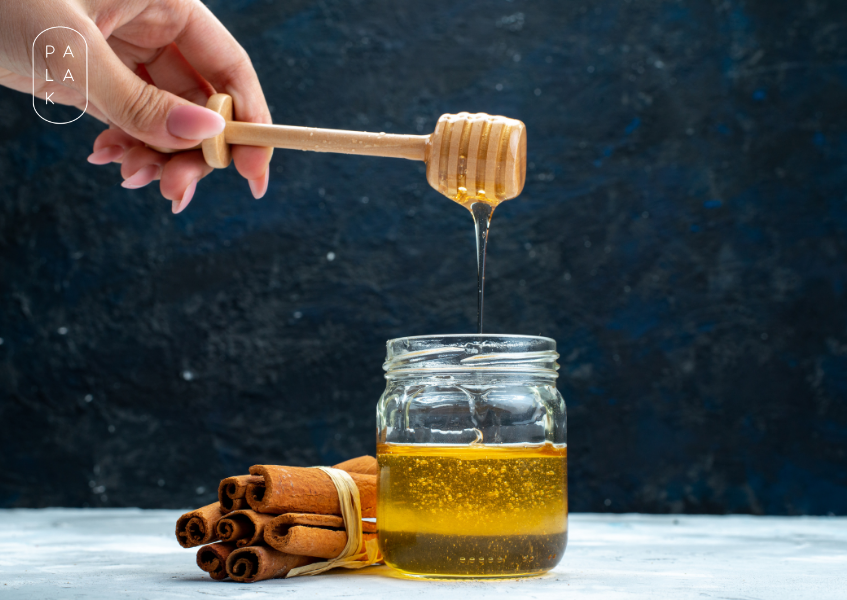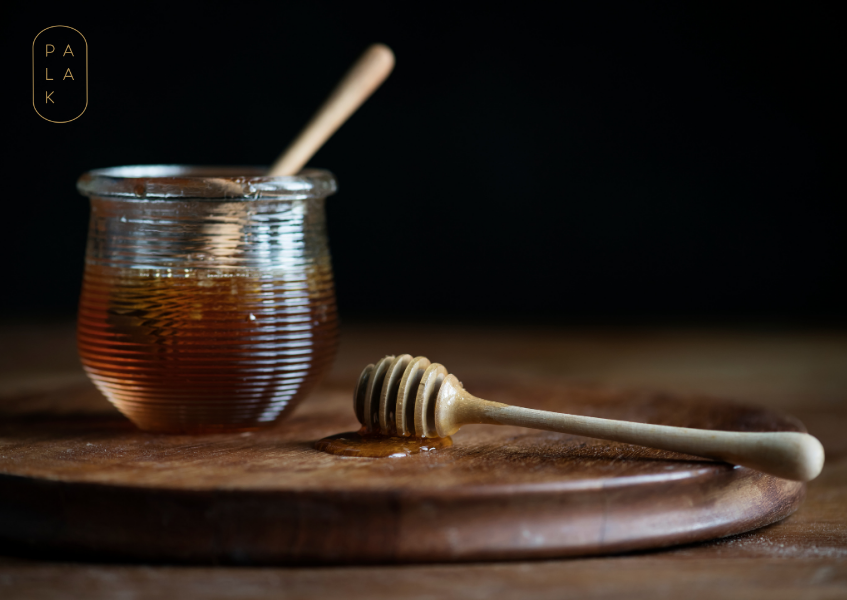For International Orders Please WhtatsApp On
+91 76529 22771
Powerful Health Benefits of Raw Honey Vs Regular Honey Vs Manuka Honey

"Honey is a thick golden liquid made by bees to store in their hives as food. The bees make it by collecting nectar from flowers and is sweet and delicious. Depending on which flowers the bees collect the nectar farm, the colour varies from dark, golden brown to very light shades of gold. In this post, the health benefits of raw honey are discussed.
It has many benefits for your health and is easy to find in stores and markets everywhere. As with a lot of other foods, honey is also healthier when it's unprocessed. In fact, processed honey barely has any health benefits if at all. When people speak about the health benefits of honey, raw honey is the type they are talking about.
What is Raw Honey
This is honey that has never been processed. It has never been pasteurized, has never been heated above 35°C/95°F and is often unfiltered. The pollen and propolis are still present although often the honey has been strained to remove any wax, wings, legs or bees that might have fallen in. Honey is not the only thing that bees make. Bees also make propolis for example. Scientists have observed 300 different beneficial compounds including antioxidants and amino acids in the propolis. Bee propolis benefits include it having antimicrobial, antioxidative, anti-ulcer and anti-tumour properties.
What is Organic Raw Honey
This is how Raw Honey looks like. It is light in colour and opaque. Organic raw honey is generally treated the same as raw honey with the exception that the farms adhere to the regulations set by each country for organic farming. The farmers don't use pesticides and in order for honey to truly be organic, the surrounding area of flowers that the bees go to in order to collect nectar need to be free of pesticides.
Benefits of Raw Honey

1. Honey is an excellent source of energy as it's full of carbohydrates. Athletes often consume it as part of a pre or post-workout snack to make sure that they have enough energy for their workouts and sufficiently replenish their energy stores after a workout.
2. It has a low glycemic load of only 10. Honey is 80% sugar, but the form of sugar that it contains doesn't spike your blood sugar levels as high as white processed sugar does making it a healthier sugar alternative. When combined with cinnamon it has blood sugar lowering effect. Here you can read the full article about the best and worst sweeteners
3. Honey can help you with your sleep problems. It helps your brain to release melatonin which is a hormone that regulates your sleeping patterns. Your brain releases it at night which is what tells your body to go to sleep and continues releasing it throughout the night to help you stay asleep. Getting good quality sleep is important for your health and helps lower your risk for many diseases including heart disease, type 2 diabetes, and arthritis.
4. Honey is full of antioxidants. It contains polyphenols and flavonoids which help lower your risk of various cancers and heart disease.
5. Honey has antibacterial properties that are great for treating burns and wounds, gingivitis, and using it as a cough syrup (a dose is 1/2 tsp - 2 tsp). It can also help for acne though more research is needed to fully support this claim.
6. Honey can be used with lemon and ginger to help relieve nausea. Be careful not to put honey into hot tea, wait for it to cool down to drinking temperature before adding it to preserve the healthy nutrients.
7. Raw honey contains 22 amino acids making it a complete protein. It's full of minerals which include iron, zinc, potassium, calcium, phosphorus, magnesium and selenium. Honey is also a source of vitamins B1, B2, B3, B5, B6 and C which are beneficial for your nervous system, skin and immune system.
8. Honey contains enzymes that help with indigestion and there is some research that indicates it can even help with acid reflux though research is still ongoing.
9. Research suggests that honey may be effective in helping with weight loss by curbing cravings by regulating the hormones that cause them. Studies were done that show that honey can lower cholesterol and triglyceride levels (a type of fat found in your blood) reducing the risk of heart disease.
10. It may also be effective in helping people with allergies to animals as well as seasonal allergies as it helps to build up a tolerance to them.
Processed Honey
This is what it looks like. This is what you have been eating it for years. Processed honey is honey that has been heated up and filtered. Often it goes through a process called ultra filtering which removes the pollen in order to extend the shelf life. Processed honey is usually clear and smooth because this looks more appealing to many consumers.
There are many different brands stocked in stores and supermarkets all over and with honey being marketed as food full of health benefits many people buy processed honey because they are so plentiful and cheaper than the raw versions. Processed honey is not beneficial for your health
- The honey is heated up to above 35°C/95°F, sometimes up to 71°C/160°F. The moment honey is heated up past 35°C/95°F the nutrients in it start being destroyed. The vitamins, minerals, and enzymes are lost including propolis. Propolis is one of the substances that causes the antibacterial properties in honey.
- The pollen is also removed to ensure that the honey is clear which takes away the rest of the remaining health benefits.
- The FDA has said that processed honey can't be called honey since all the health benefits have been removed.
- Even worse, some manufacturers add corn syrup, which is one of the worst forms of sugar, making honey unhealthy
- The bees at the farms that produce processed honey are often treated with antibiotics due to the hives being full of parasites and bacteria that cause illnesses.
- Often the honey has been chemically processed like when they add corn syrup. In the case of poor quality honey from China, when the U.S. banned it, the leftover honey was sent to India where pollen was added. Similar processes to this have contaminated honey and often the true origin of the honey can't be determined, if at all. You have no idea where your honey is coming from.
What is Manuka Honey?

Manuka honey comes from the manuka plant native to New Zealand and often has more benefits than raw honey. UMF measures the antibacterial properties of manuka honey and is a guarantee of quality and assurance that it can be used medicinally. There are different levels of UMF indicating quality as not all manuka honey is equal. I have Raw honey in my house that I use daily, in my yoghurts and I have Manuka honey as well to use in the place of antibiotics. Unfortunately, we cannot use Manuka for kids under 2 years.
- UMF 5-9: Standard/low grade
- UMF10-15: Medium grade
- UMF16 and up is considered to be superior quality
What to Look For When Buying Honey
A study conducted by the Palynology Research Laboratory at Texas A&M University found that out of 60 different kinds of honey that they tested at various stores, 76% of them contained no bee pollen. With so much processed honey filling the shelves at supermarkets, how do you know which is the raw honey? It can be difficult to tell them apart, but because raw honey still contains pollen and crystallizes after some time the honey often looks cloudy or creamy.
Although not foolproof, another thing you can do is look for the words "Unpasteurized", "Unfiltered", "Unprocessed" and "Raw honey". Another way to source raw honey is to go to a reputable bee farm or farmers market and buy it straight from the farmer. Some things that differentiate Raw honey from regular honey are as follows: Website the heartlysoul.com clearly indicates:
Raw Honey Precautions
While honey is safe to consume in food quantities for most people, here are a few things you might need to be careful of or speak to your doctor about:- Honey shouldn't be given to children under 12 months of age. This is because honey can sometimes contain botulism spores that are harmful to babies but doesn't affect older children and adults. Botulism is a rare disease caused by bacterias that grow on unhygienic foods.
- Don't eat too much honey, while it's safe in food amounts if you eat excessive quantities you could develop mild honey intoxication. Symptoms include nausea, sweating, weakness, and dizziness.
- Speak to your doctor before eating honey if you are on medication for seizures, blood thinners and medications that thin the blood like aspirin, ibuprofen, and naproxen, or any medication that affects your blood sugar levels.
- Speak to your doctor if you have a weakened immune system due to radiation or chemotherapy.
- If you have pollen, celery, or other bee-related allergies, you may not be able to eat raw honey.
- Tests show that honey that has been heated above 60°C/140°F produces hydroxymethyl furfuraldehyde (HMF) which is carcinogenic and can affect your health badly. While these tests were only done on rats, it's better to steer clear of honey heated to these temperatures.
Conclusion:
- Raw honey is packed full of healthy vitamins, minerals, enzymes and protein as well as pollen and propolis.
- Raw honey has antibacterial properties.
- Raw honey is a healthier alternative to sugar.
- Raw honey can help lower your risk for various illnesses including cancer and heart disease.
- Processed honey has no health benefits.
- Processed honey can even be detrimental to your health due to being heated to high temperatures and added corn syrup.




